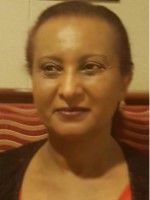Due to copyright reasons, an electronic copy of the thesis must be ordered from the faculty. In order for the faculty to have time to process the order, it must be received by the faculty no later than 2 days prior to the public defence. Orders received later than 2 days before the defence will not be processed. Inquiries regarding the thesis after the public defence must be addressed to the candidate.
Trial Lecture – time and place
See Trial Lecture.
Adjudication committee
- First opponent: Clinical Research Associate Professor Jessica Carlsson Lohmann, University of Copenhagen, Denmark
- Second opponent: Professor Emeritus Tore Sørlie, The Arctic University of Norway (UiT)
- Third member and chair of the evaluation committee: Associate Professor Mekdes Gebremariam, University of Oslo
Chair of the Defence
Professor Emeritus Ulrik Fredrik Malt, University of Oslo
Principal Supervisor
Researcher Lars Lien, University of Oslo
Summary
After 30 years of war, Eritrea earned its independence from Ethiopia in 1993. By 1998, a new border dispute erupted. Eritrea is still in a “no war, no peace” situation and subject to United Nations economic sanctions. With 27 855 Eritrean refugees in Norway in 2020, Eritreans were the second largest African immigrant group after Somalis.
This is a mixed methods (qualitative and quantitative) study on female Eritrean refugees living in asylum reception centres in Norway. The aim was to describe and better understand the relationship between their trauma exposure, religiosity/spirituality, resilience, and quality of life. Before, and during the flight, or even inside refugee camps, women and girls are especially vulnerable to violence during war and civil conflicts. An endless military service, harassment from officials, and forced marriage were among the reasons for fleeing Eritrea. During the flight rape, being beaten, and being sold between different human traffickers were among their traumatic experiences. Living conditions at the asylum reception centre and the “endless waiting” for placement in a municipality were challenging. They understood their symptoms (e.g., disturbed sleep, poor appetite, impaired concentration, anxiety) to be normal responses to their experiences and present situation. Religiosity was a main source of coping and resilience. Religiosity/spirituality was independently associated with general quality of life. Number and type of trauma were positively correlated to religiosity.
- This study will contribute to identify factors that reinforce resilience, which is important for the integration process of refugees.
Additional information
Contact the research support staff.
